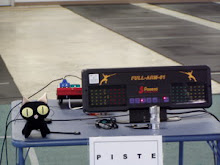There are three weapons in Western-style fencing; our main weapon at Swords of Sam Houston is the epee, but we have some foil fencers as well. We don't have anyone who fences sabre, which is arguably the most difficult (and the most expensive) of the three.
Fencing is a physically and mentally demanding sport that has derived from duelling[sic] with swords, which was common centuries ago. The goal of the sport remains the same: to hit an opponent with your sword without being hit yourself. Fencers use lightweight, blunted swords and wear protective equipment, but bouts are still fast and fiercely contested.
At schools and fencing clubs, new fencers are typically started with foil unless they specifically want to learn a different weapon. The tactics in foil translate well to either epee or sabre, but foil rules are more similar to sabre than to epee. SSH fences epee partly because it's what my friends and I had experience with when the club was founded, and because safety gear for epee tends to be cheaper.
Epee is sometimes seen as the most realistic of the three games, partly because of the rules and partly because of the weapon itself. An epee is made of stiffer, heavier metal than a foil or sabre, and the bellguard is large enough to protect a fencer's hand if the fencer is careful. The basic idea of epee fencing is to hit an opponent anywhere on his body. The rules in epee make it much easier to score points than the rules in foil or sabre.
Epee techniques emphasize point control, or accuracy, and counter-attacking. A counter-attack is illegal in foil or sabre.
Foil and sabre have something called right-of-way or priority rules. Pretend you're a fencer. You have priority if you have just responded to an opponent's attack; this response is called a parry, and it can be anything from using your blade to push your opponent's blade away or just retreating out of the way. Your opponent just lost his right-of-way, and you can attack. Since you just parried, your attack is now called a riposte. However, if you attacked your opponent without parrying first, your attack was a counter-attack. You don't get a point because counter attacks are attacks made against the right-of-way. I guess you could say that counter-attacking is like driving the wrong way down a one-way street.
Priority rules get even more complicated than this sometimes--there are counter-parries and counter-ripostes and more. People who want to be fancy call all this dancing around the poetry of the sword, or the language of the blade. Epee fencers call it a waste of time.
In epee, all you have to do is hit the other guy first. Easy, right? It doesn't matter who parried what first, although it's a good idea to know how to parry so you can keep your opponent from hitting you.
Another problem with foil and sabre is their designated target areas. Foil fencers can only score a point by hitting their opponent's torso. In sabre, the target area is everything from the waist up.
In epee, the entire body is a target. You can hit your opponent on his little toe and still get a point. If you're really good, you can hit your opponent's hand, which is almost guaranteed to annoy them.
Because foil and sabre have target areas, fencers need special equipment for electric scoring systems to work; they wear a conductive cloth called a lame over their target areas. Lames are expensive. Epee fencers don't use them. Not having to buy lames means our club has more money to spend on weapons and spare parts. 
 Foil lame by Leon Paul: $156. Sabre lame by Leon Paul: $256.
Foil lame by Leon Paul: $156. Sabre lame by Leon Paul: $256.
Rules and weapons are out of the way now, I hope. There's also a ton of jargon, which I'm not going to get into. I think it's easier to learn the language as you're learning to fence rather than learn it through someone's long-winded explanation.

1 comment:
I never even knew we had a fencing club here at school. I also never knew the object of the game or that there were so many rules. But now with the explaination it sounds pretty interesting and fun. Does the school ever have shows or competitions or are the games just within the club? I think it would be cool to come watch sometime.
Post a Comment